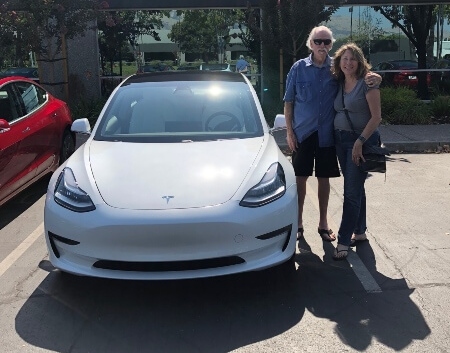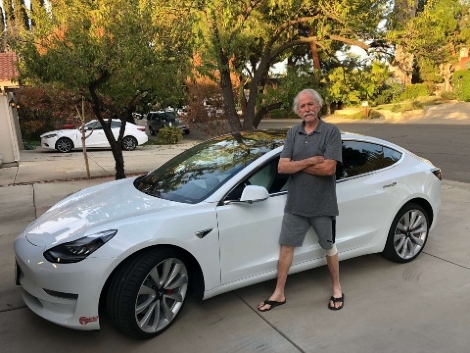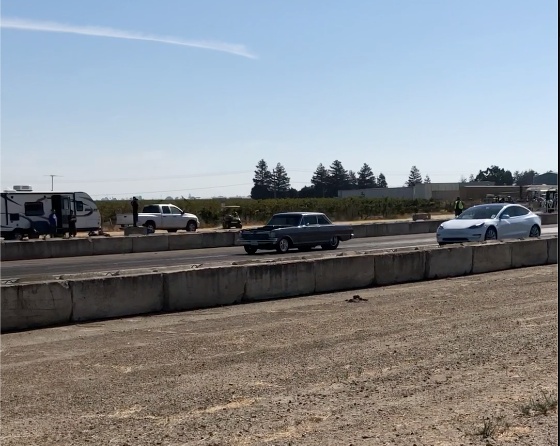Mesothelioma Survivor’s Continued Quest for Speed

Fact Checked | Written by: Tim Povtak | Last Update: 03/12/2025 | 6 Min Read
Mesothelioma survivor Jim Huff has taken his bucket list to another level, resuming his lifelong passion for speed.
Cancer remission never felt like this before.
Since being diagnosed with malignant pleural mesothelioma in 2016 and initially setting his sights on learning to play guitar, Huff has grown considerably bolder with age.
He now wants to crack the 200 mph barrier in a drag race at the famed Texas Mile racetrack in Beeville, Texas, an eye-opening goal even for a much younger, healthier man.
“I guess I’m being a little more adventurous now, particularly at this stage of my life,” Huff said from his home in Northern California. “But can you imagine the thrill?”
Keytruda Worked Wonders for Mesothelioma Survivor
Huff, 70, has defied the odds in many ways since his stunning diagnosis of mesothelioma more than four years ago.
When doctors determined his disease was too advanced for aggressive surgery and he declined chemotherapy, Huff turned to medical marijuana as an effective, short-term treatment.
But when tumor growth returned 15 months later, Dr. Thierry Jahan at the University of California San Francisco Medical Center started him on pembrolizumab, the immunotherapy drug known by the brand name Keytruda.
Although Keytruda has shown effectiveness in less than 25% of mesothelioma patients, it worked wonders for Huff, who used it along with CBD oil and THC oil found in medical marijuana.
Two years and approximately 30 treatments later, Huff stopped taking Keytruda in February. Repeated tests have shown no new tumor growth. He feels good again. Doctors are using the word remission, which is rare in this cancer with no cure.
Fewer than half of patients with pleural mesothelioma live for more than a year after diagnosis. The five-year pleural mesothelioma survival rate is just over 10%.
“I always heard Keytruda either works great, or it doesn’t work at all for a majority of patients,” Huff said. “I was a fortunate one. It’s still in the back of your mind that it may recur — and it probably will — but hopefully science will catch up to it before it does. In the meantime, I have things I want to do.”

Drag Racing Is in His Blood
Much of Huff’s latest need for speed was sparked by his purchase of a high-performance Model S Tesla and its acceleration rate of 0 to 60 mph in 2.3 seconds.
It was just what he wanted.
Although he spent much of his working life driving a truck, Huff always loved driving fast cars, or at least pretending they were fast. He punched holes in the muffler of the first car he owned as a teenager, which didn’t make it any faster, but it sounded louder and impressed his friends.
Coming home from work one night years ago on Interstate 580, an east-west highway in Northern California, he reached 140 mph in his high-performance Mustang. And he lived to tell about it.
“When you’re looking straight ahead it doesn’t seem that fast, but look sideways, and you’re flying,” Huff said. “It’s quite a rush.”
In 2018, he took his Tesla to the Kingdon Drags racetrack in Lodi, California, where his son lives not far from Huff and his wife.
He raced there again in 2019, winning three consecutive head-to-head matchups, covering a quarter-mile in 11 seconds. He reached speeds of 110 mph.
“People ask me, why are you doing this at your age? It’s hard to explain, but it can really put a smile on your face,” he said. “You get a helluva rush from it, that’s for sure.”
Both spring and fall events at the racetrack in Lodi were cancelled for 2020 because of the COVID-19 pandemic, but it has Huff considering another track in Sacramento about 60 miles away.
He has talked to his wife several times about a trip to the famed Texas Mile track, where he could live out his dream of 200 mph, but only with some high-tech, expensive upgrades to the car.
“I’d have to wear her down to convince her,” he said. “But really, it would be too much car for 75% of the population. People would be killing themselves. Yet I might be able to pull it off.”
Mesothelioma Role Model
In the meantime, Huff has been content to leave his car in “chill” mode and refrain from his earlier street racing days. Admittedly, though, he still is easily tempted.
Earlier this year, Huff was discreetly challenged at a stoplight not far from his home in Tracy, California, by a much-younger man driving a performance-style Dodge Challenger.
Both nodded in agreement, and the other driver started revving his engine. Huff just smiled. When the light turned green both cars roared away. The Tesla never trailed through the next quarter mile of road.
The Challenger quietly made a left-hand turn down a side street, obviously beaten and never seen from again.
“I get tempted, and I can usually restrain myself on the street, but not that time,” Huff said. “How embarrassing for the other guy, though, being beaten by a gray-haired grandpa with handicap license plates. Can’t be anything worse.”
Huff, meanwhile, is still taking guitar lessons. He lacks the stamina he once had and the walks are shorter and slower than before. His energy level is tough to predict from day to day, hour to hour, a mesothelioma reminder.
He and his son are taking forever to rebuild a 1958 Ford pickup truck they bought as a way to stay connected. Huff talks about the smoke still lingering from the forest fires that raged through Northern California, and about COVID-19 changing the world today.
Inevitably, though, the conversation returns to his bucket list and his continued quest for speed.
“I’m having the time of my life,” Huff said. “If I can help others by setting an example, I’m more than happy to do that. If I can get to Texas and hit that 200 miles-per-hour mark, I’d be one happy man.”






